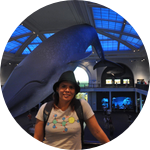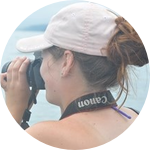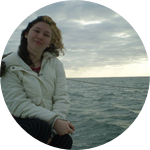About This Project
This project will use whale watching as a platform for scientific research and environmental education. Activities will include workshops with whale watching operators and research surveys. In Tribugá’s Gulf, Colombian Pacific, research efforts have attempted to fulfill information gaps on humpback whales. However, integration of science and community-based tourism is necessary to achieve long-term conservation benefits.Ask the Scientists
Join The DiscussionWhat is the context of this research?
Macuáticos Colombia Foundation began research and
environmental education in Tribugá's Gulf in 2009. Information gaps prevailed due to focalization of research and lack of integration with local whale watching. In 2013, we collected data on song, spatial distribution, behavior and social structure.
From this data, we identified 129 whales. We registered 37 interactions with commercial vessels. About 30% of those interactions elicited an evasive response, mainly when boats failed to adequately approach or follow the animals.
Based on this, the current project intends to collaborate with the local communities and whale watching operators to collect more research and promote sustainable interactions with the whales in order to reduce the negative impacts of human activity.
What is the significance of this project?
The isolated nature of the Colombian Pacific increases the
cost of boat-based research, difficulting long-term monitoring and conservation benefits. While studying humpback whales in Tribugá’s Gulf, we detected negative impacts of whale watching. In order to promote long-term sustainability, our team intends to form an alliance with the whale watching operators.
Macuáticos Colombia offers the knowledge and experience of researchers to improve the quality of environmental education occurring during whale watching tours. In exchange we expect to have the chance to conduct scientific observations during sightings. In this way, the current project intends to support the conservation of humpback whales by promoting sustainable tourism practices.
What are the goals of the project?
Our main goal:
Evaluate the possibility of integrating scientific research and whale watching tourism in order to optimize conservation efforts for humpback whales while supporting alternative economic strategies for the local communities in the Colombian Pacific.
Our specific objectives:
- Examine the conservation impact of whale watching on the behavior and habitat use of humpback whales in Tribugá’s Gulf.
- Assess the potential of community based whale watching as a platform for scientific research and environmental education.
- Describe the behavior, social structure and spatial distribution of Humpback whales.
- Associate with the local communities to develop educative activities that promote the conservation of natural resources in the region.
Budget
Our study area is quite remote and difficult to access, and this greatly increases fuel prices. High operational expenses, which could be reduced with an alliance with the whale watching operators, usually prevent long-term research programs that are more likely to achieve conservation benefits.
We believe the conservation impact of our research program can be greatly enhanced if we work in collaboration with the local communities instead of renting a private boat. In this way we will be promoting a sustainable economic strategy for the local communities while trying to eliminate or minimize the negative effects for the whales.
In this way, the entire budget of this campaign will be dedicated to fund fuel for boat trips to monitor the behavior and habitat use of humpback whales during the breeding season.
A typical boat trip will cost approximately $52.50 dollars in fuel. We intend to complete at least 60 boat trips which makes a total of $3150.
All other equipment is already owned by the project personnel. These include a digital SLR camera, GPS, Hydrophone, pH meter, YSI, anemometer, video camera and water resistant paper.
The funds requested in our Experiment campaign cover approximately 25% of the project's budget. The remaining amount is expected to be covered by several research grants.
Endorsed by
Meet the Team
Team Bio
I got my Biology degree at the University of Antioquia in Medellín, Colombia. I have worked primarily with humpback whales in Salinas, Ecuador and in Nuquí, Colombia. Currently, I am a M.A./PhD candidate at the Marine Mammal Behavior and Cognition Laboratory of the at the University of Southern Mississippi.Additionally, I am a founding member of Macuáticos Colombia, a non profit organization that works for the conservation of aquatic mammals in Colombia. Back in my time as an undergraduate student, I had to leave the country looking for opportunities to get trained and get field experience.
Macuáticos Colombia is extremely interested in helping young students to access opportunities to get involved in conservation and community work in the local communities where our research projects take place.
Natalia Botero
I got my Biology degree at the University of Antioquia in Medellín, Colombia. I have worked primarily with humpback whales in Salinas, Ecuador and in Nuquí, Colombia. Currently, I am a M.A./PhD candidate at the University of Southern Mississippi and I am part with Macuáticos Colombia, a non profit organization that works for the conservation of aquatic mammals in Colombia. My research interest include cetacean behavioral ecology, population biology, social structure and habitat use.
Maria Zapetis
Maria is a doctoral student in the Marine Mammal Cognition and Behavior lab at the University of Southern Mississippi. She has gained extensive field experience researching savanna ecology in the Kruger National Park (South Africa) and cetacean behavior and acoustics in Key Largo, FL. She has been selected to attend an intensive week-long bioacoustics workshop (SeaBASS) hosted by Pennsylvania State University and funded by sponsors Acoustical Society of America, National Oceanic and Atmospheric Administration, and the Office of Naval Research. Here, she aims to enhance her foundation of marine animal acoustics, foster technical communication across disciplines, and develop professional relationships within the field. Directly after this workshop in Washington, D.C., she will fly to Colombia to be our resident acoustician in the endevour to record humpback whale song with us in the field.
Additional Information
About usMacuáticos Colombia Foundation, is a non-profit organization dedicated to the study and conservation of aquatic mammals in Colombia. Most of our research efforts have focused on humpback whales in the Colombian Pacific, although we also work with several dolphin species and the West Indian Manatee.
In 2009 we first registered the presence of seven cetacean species in coastal waters of Tribugá's Gulf as part of an inventory study. Then, in 2013, we monitored the spatial distribution, social and acoustic behavior of humpback whales during the breeding season. An important component of this project was the assessment of the impact of whale watching tourism and vessel traffic on the animals. Now that we have some evidence that whale watching can have some negative effects on the whales that come to Colombia to mate and nurse their young, we need YOUR generous support to help us protect them.
We believe that the best way to create a long-lasting conservation effect is to work in association with the local communities. An alliance with the whale watching operators in Tribugá's Gulf will help us achieve our goal to carry on a long-term research program while supporting sustainable economic alternatives for the local communities.
How are we going to achieve our goals?
1. Environmental Education: We will visit the seven villages that comprise Tribugá’s Gulf and develop a series of workshops that will facilitate cooperation between researchers and tourism operators. Additionally, we will complete different environmental education activities including: writing/drawing contests, games, cultural events, beach clean ups, and movies/documentaries.
During boat trips, the research team will record the type of approach, maneuvers, heading and speed of whale watching boats as well as changes in diving pattern and surface behavior, of the humpbacks, to describe the behavioral response of the animals. This information will provide feedback for the workshops that will be implemented with whale watching operators of Tribugá’s Gulf.
2. Research boat trips: A minimum of 60 boat surveys will be made during the breeding season of humpback whales (mid June-mid November). Additional trips will also occur opportunistically as researchers are able to join fishermen and/or whale watching operators.
After sighting a group, the boat will approach until an estimated distance of 100m, behind or parallel to the animals. Information about group size, age classes, surface behavior, diving patterns, heading, position and oceanographic/climatic conditions will be recorded. A single hydrophone will be deployed when the boat is stopped or whenever singers are detected. Photographs of the caudal fin will be taken to complement Macuáticos’s existing photo-id catalog.
Project Backers
- 6Backers
- 7%Funded
- $210Total Donations
- $35.00Average Donation






